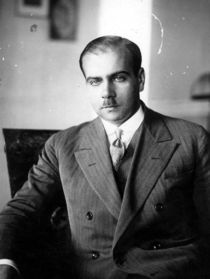Born in Warsaw on the 1oth of September, 1891, into a family of intellectuals. He studied philosophy at the Jagiellonian University as well as architecture in Milan, law in Tartu, and agricultural science in Warsaw. During the First World War he served in the Russian Army; then he associated with Józef Piłsudski’s camp and took part in the forming of the Polish Corps in Russia and in their subsequent operations. He joined the Polish Military Organization (POW) in 1918 and in February of the same year commanded Polish forces that captured Minsk. In May 1918 he tried to replace General J. Dowbór-Muśnicki as commander and take up armed struggle against the Germans. Having departed for Kiev, he took command of the POW in Russia, Ukraine, and Belarus. From November, 1918, he served in the Second Unit of the General Staff of the Polish Army as its deputy head and then, from August 1920 until 1923, as its chief. As a military expert, he participated in the negotiations with the Soviets in Riga. In 1924-26 he was the military attaché in Rome; in 1928-29 – Polish envoy in Budapest; in 1929-31 - Minister of the Treasury in several successive cabinets; in 1932-36 – the editor-in-chief of the pro-government “Gazeta Polska” and “Polityka Narodów”. He is one of the most eminent Polish publicists and geopoliticians of the interwar period. A rightist follower of Piłsudski, after the Marshal’s death he found himself in opposition to the ruling Sanation camp. Associated with the Conservative circles, he was a close collaborator of Walery Sławek and an opponent of the Foreign Minister Józef Beck and the Commander-in-Chief Edward Rydz-Śmigły. In September 1939 he headed the operation to evacuate the gold of Polish Bank to France. Assailed also by opponents of the Sanation, he was debarred from any form of political activity and, in spite of his entreaties, never received a military assignment. After the fall of France, he made his way to Portugal through Spain (where he was imprisoned for several months); from there he went to the United States. He settled down in New York, where he started publishing, mainly in “Nowy Świat” and “Dziennik Polski”, criticising the political line adopted by the cabinets of Władysław Sikorski and his successor Stanisław Mikołajczyk, and particularly their concessions in favour of the Soviet Union and the Western Allies, and demanding an independent Polish policy. With foresight, he pointed out to Stalin’s consistent policy in regard to the Polish question and to the the disloyalty of the Western Allies. He was severely assailed by opponents of the Sanation, particularly by leftist circles, as well as by American press. His activity as a publicist, in which he was so critical of the Western Allies, was restricted by the American administration. He was a co-founder of Józef Piłsudski Institute on America (headquartered in New York), and of the National Committee of Americans of Polish Descent (KNAPP). He died in New York on the 3rd of August, 1946. His journalism was published in the selections entitled Próby syntez (1937), and Wybór pism (1952).

